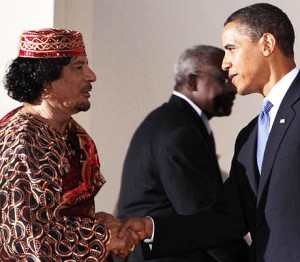The Decline & Fall of Muammar el-Qaddafi
Posted By Greg Johnson On In North American New Right | Comments Disabled718 words
Translations: Portuguese [2], Czech [3], French [4], Ukrainian [5]
Col. Muammar el-Qaddafi ruled Libya for 42 years. He came to power in a military coup against Libya’s King Idris, who was basically the satrap of international capital, ensuring that the exploitation of the country’s oil wealth benefited foreign oil companies and himself, but not the Libyan people.
Qaddafi forced the oil companies to share their wealth with the Libyan people. He funded schools, clinics, and infrastructure. Literacy, health, and life-expectancy soared. But he did not want Libyans to become lazy and corrupt like the citizens of the oil-rich Gulf States. He constantly reminded Libyans that the oil would run out someday and they would have to work to become self-sufficient.
Qaddafi seems daffy to most westerners, but his political philosophy and practice were actually quite consistent: he rejected homogenizing modernity. He saw both capitalism and communism as essentially the same in their materialism, globalism, and leveling. He advocated a third way in which traditional forms of life, which are ineradicably plural and particular, might selectively embrace modernity. He funded national liberation groups such as the PLO and the IRA. He supported anti-globalization movements and leaders like Hugo Chavez. He enjoyed thumbing his nose at the United States. After the fall of the USSR, he did everything he could to frustrate the emergence of a completely unipolar pax Americana. He was as nationalistic as any leader can be when saddled with a universalistic religion.
Qaddafi committed many crimes. He indulged in many expensive follies. He had terrible taste.
But perhaps Libya would be at peace not in ruins, and perhaps Qaddafi would be alive and in charge today, if he had not made a single fatal error: he decided to play patty-cake with America. After 9/11, he shared intelligence on Al Qaeda with the United States. He agreed to abandon nuclear weapons research, even though a nuclear deterrent is the only way a country can maintain its independence in the world today. He tortured Muslims on behalf of the United States and the UK so they could, with typical Anglo-Talmudic hypocrisy, maintain their pretenses of legality.
He referred to Condoleeza Rice as “Leeza, Leeza, Leeza,” and vowed that he “loved her” as if he were a star-struck hairdresser not a serious head of state. Perhaps he was auditioning for Inside Edition. As far as I know, he never hosted Saturday Night Live or made it on Oprah.
Throughout most of his rule, Qaddafi was both loved and feared. He was loved because he increased the well-being of his people and because of his increasingly eccentric charisma. He was feared because he dealt harshly with his enemies. But one can retain power while being feared. In fact, it helps. One cannot, however, rule while being held in contempt. And by truckling with America, Qaddafi made himself contemptible in the eyes of his people.
Becoming a whore for America might have compensated Qaddafi for the loss of his people’s esteem if it had won him a faithful friend and stable ally. But America is incapable of such friendship. All alliances are, of course, conditional on serving the self-interest of all parties. But America is given to infantile fits of moralistic enthusiasm which trump considerations of national self-interest. America’s leaders really believe their bullshit.
So when the Arab world was all atwitter about “democracy” and “change” and overthrowing “dictators,” all calculations of national self-interest, all realism about prospects for democracy in Arab countries, even the ultimate good (namely Israel’s self-interest) went out the window. Qaddafi had to go, under a round-the-clock barrage of liberal pieties and bombs.
I don’t know if Qaddafi ever regretted his opening to the “West,” but his defiance right up to the end almost redeemed him in my eyes.
The lessons should be clear to other Arab rulers who are being targeted by the same forces: one can afford to be feared and hated, but one can never risk becoming contemptible in the eyes of one’s own people by seeking the friendship of the United States. The United States, moreover, is a fickle and worthless friend, unworthy of betraying one’s own people to court. The only path to safety in this world is that of North Korea and Iran. A nuclear deterrent is the sole guarantee of sovereignty left on this planet.
